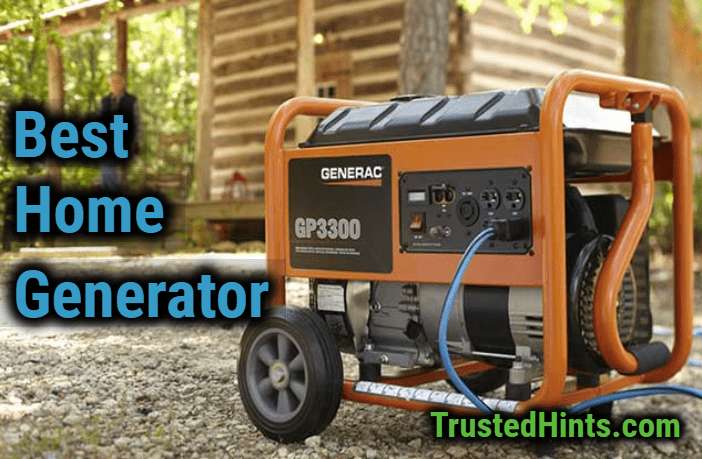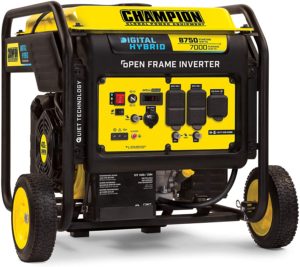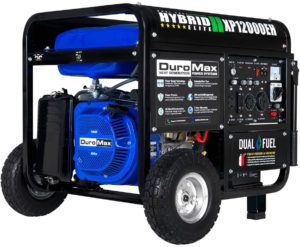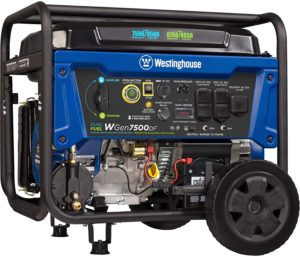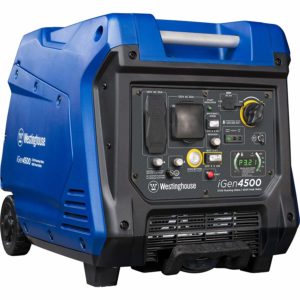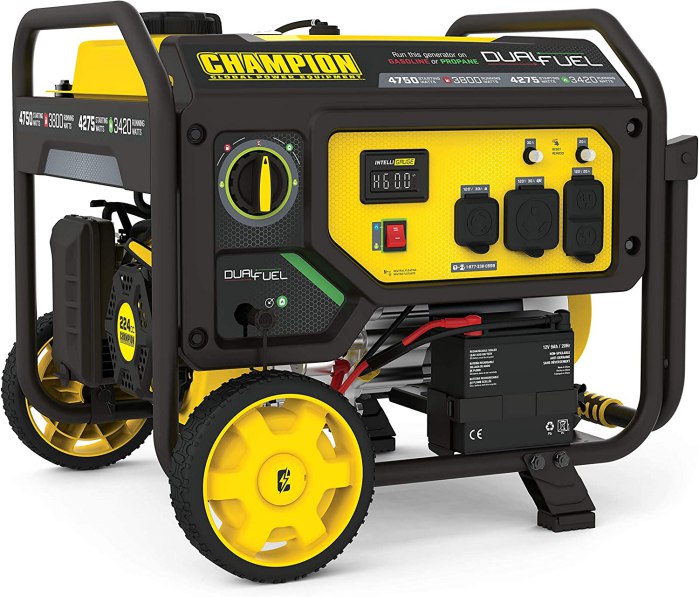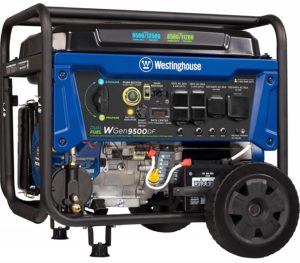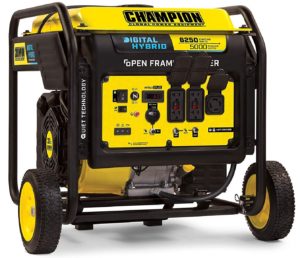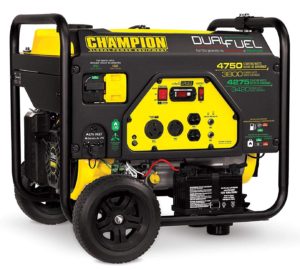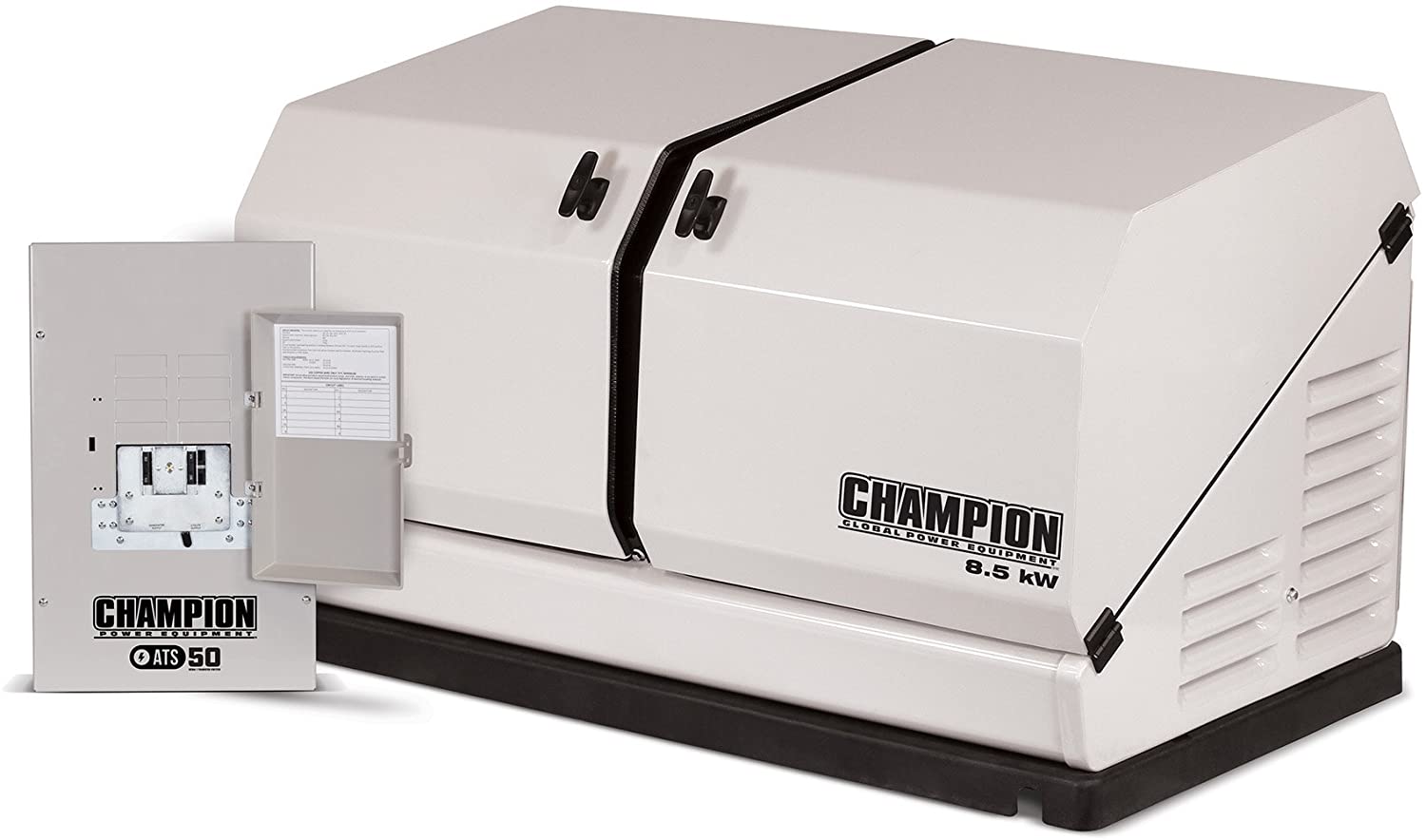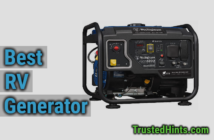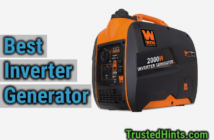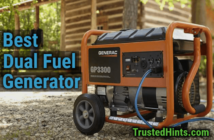If you experience frequent power outages in your residence, then the generator is the best investment for you.
So if you have a big house and you want to run many high-power-consuming appliances simultaneously, then the whole house generator or standby generator is for you. If you’re going to run minimal devices, then you can choose a portable generator having a range of 9000 watts.
First of all, you need to decide what type of generator you need. And after addressing that question comes the power output.
We have reviewed many generators according to their type, power output, and other features. Check out the Reviews of the Best Home Generators of 2022.
| Champion 100520 (Best of The Best)
      |
| DuroMax XP12000EH (Highest Power Output)
      |
| Westinghouse WGen7500DF (Another High Power Generator)
      |
| Westinghouse iGen4500
      |
| Champion 201052
  |
| Westinghouse WGen9500DF
      |
Best Home Generators 2022
1. Champion 6250-Watt DH Series Open Frame Inverter for Home Use
Champion 6250 has a fuel tank capacity of 4.2gallons, and it is capable of supplying power for 13.5 hours on a quarter load. It can crank out 6250 surge watts and 5000 running watts.
This inverter generator has an eco mode, 4 AC 120V outlets, 1 120/240V RV ready outlet, 12V DC outlet, and low-oil, overheat & output indicators as well. It also has a Digital display that updates the session & total run-time, volts, and frequency.
Champion 6250 emits a noise of 69dBA on a quarter load, so it is not recommended for the campers, but for house emergencies, this is a great choice. The generator weighs 121 pounds, but it comes with never-flat-tier wheels that make it easier to carry everywhere.
A quick drain oil tube makes oil changing hassle-free, and a low-oil shut-off sensor prevents the generator from damage.
- The generator is parallel compatible
- A Low THD of 3% allows the charging of sensitive electronic devices without any worry
- EPA and CARB compliance
- The generator comes with 3 years warranty and lifetime technical support
- No dedicated USB slot.
- The generator comes with a wheel kit but 121 pounds is difficult to carry everywhere
2. DuroMax XP12000EH Gas Powered Portable Generator for Whole House
Duromax XP 12000eh provides the amount of power that is normally found in standby generators. It has a fuel tank capacity of 8.3 gallons and provides a power supply of up to 10 hours on a 50% load. Duromax has 12000 starting watts and 9500 running watts.
This home generator has 1 AC 120V 30A outlet, 2 AC120V 20A GFCI outlets, 1 AC 120V/240V 30A outlet, and 1 AC 120V/240V 50A outlet. Eco-mode and Low oil shut-off features prevent the equipment from getting damaged.
Generators of this capacity are louder, but Duromax XP 12000eh emitted only 72dBA, which is considered as quite in this range. Powerful portable generators are heavy, and this beast weighs 217 pounds, but the handle and high-quality wheel make carrying quite easy.
Duromax XP12000eh comes with 30 days replacement warranty and 1-year parts warranty.
- EPA and CARB compliance
- Provides power supply for up to 10 hours on a full tank
- Duromax is versatile and can easily manage large loads
- Eco-mode and Low oil shutoff features prevent the equipment from getting damaged
- Too heavy to carry everywhere
3. Champion 76533 Dual Fuel Portable Generator for Home
Champion power model no. 76533 is a dual-fuel generator that produces 4750 starting watts and 3800 running watts on gasoline and on propane, it generates 4275 starting watts and 3420 running watts.
It has a fuel capacity of 3.4 gallons, and on a full tank, it works for 9 hrs., and on 20 pounds propane, it works for 10.5hrs on a 50% load.
The generator has 2 AC 120V 20A Duplex outlets, 1 RV-ready outlet, and a 120V AC 30A Locking outlet. The generator is powered by Cold Start Technology which ensures a quick start in cold weather.
Volt Guard feature for overheating and Low-oil shut-off feature protects your equipment, thus providing you peace of mind. Apart from manual recoil, the generator also has an electric start button. The noise level, of 68dBA from 23 feet is as same as the noise emitted by the vacuum cleaner.
It is difficult to carry 119 pounds of a generator, but the foldable handle and wheels make the task easy.
- Cold Start Technology ensures a hassle-free start in cold weather
- EPA and CARB approval allows use in all 50 states of the USA
- It works on both gasoline and propane, which is very useful in the long-term
- It comes with 3 years of warranty and free lifetime technical support
- No DC outlet
- With 68 decibels it is not suitable to use for camping
4. Westinghouse WGen9500DF Dual Fuel Portable Home Generator
Westinghouse wgen9500DH is a dual-fuel inverter generator that gives a tremendous 12,500 surging watts and 9500 running watts on gasoline so it is ideal for whole-house needs. While on propane, it can deliver 11,200 surge watts and 8500 running watts.
The generator comes with a massive fuel tank capacity of 6.6 gallons. On a quarter load, the generator can serve uninterrupted power up to 17 hrs when using gasoline. And on the 20-pound propane tank, gives power for up to 14 hrs.
Produces the sound at the noise level of 74dBA which is quite high than the expected level of 60 dBA. The Wgen9500df has a unique outlet called Smart Switch Ready. It’s a special feature that allows transferring power automatically. To use this feature, you need to purchase the ST switch separately.
The generator weighs 220 pounds, making it difficult to carry everywhere, but high-quality tires and handles make it easier to carry on flat surfaces.
- The engine has a 3-way starting – manual recoil, push start, and remote key that you can use from 109 yards away
- VFT display shares real-time data of voltage output, frequency, and lifetime hours
- EPA and CARB compliant
- Low oil shutoff sensor
- The fuel tank has a built-in gauge
- Supplies uninterrupted power for 17.5 hrs on gasoline on a quarter load
- No indicators light for low oil and overheating
- Commercial warranty for only 1 year
5. Westinghouse iGen4500 Portable Inverter Generator
Westinghouse igen4500 gives the power supply for 18 hours on a 25% load. This home generator generates 4500 starting watts and 3700 running watts, and it has a fuel capacity of 3.4 gallons.
The generator makes a noise of only 52dBA on a quarter load, making igen4500 one of the quietest generators in this range.
This comes with an LED display, which showcases the runtime, fuel, load, etc. Low oil, overload, and output indicators lights are also there. The generator has 2 AC 120V outlets, 1 RV-ready 30A outlet, and 2 USB slots.
It has eco mode and low-oil shutoff features. Regarding the approval, this generator has EPA, USFS, and CARB and allows use in all 50 states of the U.S. Westinghouse igen4500 and comes with a 3 years residual warranty and 1-year commercial warranty.
- The generator only makes a noise of 52 decibels, which is quieter than a normal conversation between 2 people
- It only weighs 98 pounds making it easy to carry
- On a full fuel tank, it gives the power supply up to 18 hours on a quarter load
- This generator is also parallel compatible
- It comes with a commercial warranty of only 1 year
6. Westinghouse WGen7500DF Dual Fuel Portable Generator
Westinghouse wgen7500df gives 9500 starting watts and 7500 running watts on gasoline and on propane; it shoots the 8550 peak power and 6750 running power.
4200cc 4 stroke OHV Westinghouse engine supplies 11 hours of power on 50% load on a full tank of 6.6 gallons gasoline and 8 hours on the 20 pounds propane.
Like 9500df, it also comes with a special outlet called Smart Switch Ready. It’s a special feature that allows transferring power automatically to the home appliances.
To use this feature, you need to purchase the ST switch separately. The generator includes 2 AC 120V outlets, one 30A RV ready, and one 5V DC. It is also equipped with a VFT data center that gives info about frequency, voltage, and usage hours.
On a cold early morning, if you don’t want to step out of the RV to start the generator to run a coffee maker; then you are in luck. This budget-friendly yet powerful beast comes with an autokey that allows you to start the generator with a press of a button without stepping out.
- Wireless key start makes it easier to start from a long distance.
- EPA and CARB compliant means you can use it in all 50 states of the USA.
- It comes with a built-in gauge and a low-oil shutoff sensor.
- You can change the operation from gas to propane without switching off the generator
- It has a high THD, so it is not advisable to charge sensitive electronic devices
- The generator comes with a commercial warranty of only 1 year
7. Champion 8.5-kW Home Standby Generator
The Champion 8.5kw standby generator comes with an ATS (Automatic Transfer switch) that works on Propane and Natural Gas. The generator automatically starts when the power goes out and comes to standby mode once the power is restored.
This whole-house generator works in all temperatures ranging from -22° F to 104°F. The innovative gull-wing design allows easy access to the engine and control panel.
The 439cc OHV engine gives the power supply of continuously 8500 watts on propane and 7500 running watts of power on natural gas. On propane, the generator produces 35.4amps on 240 volts, and on natural gas, it produces 31.3amps on 240 volts.
The manufacturer took a great effort to reduce the noise level using a sound-dampening lining and a low-tone muffler together which barely produces just 59.5dBA of noise.
- The generator works on propane as well as natural gas
- THD of less than 5% allows charging sensitive electronic devices safely
- Neither an extension cord is required, nor refueling is required
- It comes with 10 years warranty and lifetime technical support
- This generator is the number one choice as it is better than all other standby generators available in the market and we don’t think it has any limitations
What is a Standby Generator and how it works?
Standby generators are installed outside of the house, which power the whole house or certain appliances during a power outage. A standby generator with ATS (Automatic Transfer Switch) starts automatically within a fraction of a second during a power cut.
A standby generator works with diesel, propane, and natural gas. Diesel-fueled generators have a fuel tank attached from which it goes into internal combustion and generates electricity. This type of generator is expensive, and its production capacity is limited to the fuel tank capacity.
A dual-fuel generator can be run on propane and natural gas. The gas line is attached to the generator and an uninterrupted supply of gas keeps running the generator for several days.
During earthquakes and storms, the natural gas pipeline is shut off to prevent explosion so that time propane helps to run the generator to power your house.
Advantages of having Standby Generators:
Standby generators are capable of supplying power for several days during the blackout or storms.
The latest standby generators perform the self-diagnostics, and if any additional maintenance is required, then it will inform the owner.
Standby generators have become quieter than ever before because of new technologies. For eg., the Champion 8.5kw standby generator only makes 59.5dBA on normal use, which is less than the noise produced by 2 people having a normal conversation.
A standby generator produces clean electricity, thus allowing you to charge sensitive electronic appliances like a mobile, tablet, laptop, etc.
A dual-fuel standby generator permits to use of propane and natural gas which is very useful when the supply of natural gas is interrupted during storms, and earthquakes.
Which is better; a Standby generator or a Portable generator?
Standby generators are capable of supplying electricity to the whole house for several days. If you are living in an area that is under the attack of power outages or storms periodically, which leads to a power cut for several days, then the standby generator is useful for your house.
On the other hand, if you have less power consumption during power cuts, then a portable generator can be a suitable choice for you, and they are cheaper than the standby generator.
A standby generator comes with the ATS feature that starts the generator during power failures and gets things back to normal. Whereas the portable generator needs to start and connect manually, so if you are out of the home for a long time, then without electricity required appliances like a refrigerator, sump pump, etc. won’t work till you connect to the portable generator.
A standby generator doesn’t need much maintenance as a portable generator requires, in fact, a standby generator with newer technology checks itself periodically and informs the owner if any more maintenance is required.
Types of fuels and their uses:
Generators work on various fuels such as diesel, gasoline, propane, and natural gas. Let’s understand in brief about the fuels and their importance.
1. Gasoline:
Gasoline fuel is used in portable inverter generators widely. The main reason for its wide use is availability. As technology is improving, gasoline-fueled generators are becoming more fuel-efficient.
2. Propane:
Propane gas is known as Liquid Petroleum Gas, which is widely used for cooking and now with advancements in technology allows to use in portable and standby generators.
Like gasoline, propane is not easily available, but it can be stored for a longer period of time. A dual-fuel portable inverter generator allows using gasoline and propane as fuel simultaneously.
3. Natural Gas:
Natural gas can be supplied uninterruptedly through the pipeline making a default choice for standby generators. During storms and blackouts, the natural gas-fueled generator can power the whole house for several days.
4. Diesel:
Diesel is the oldest fuel that is used in standby generators. Diesel-fueled generators can supply more power than any other generator, which makes it useful in factories. They are not suitable for the house because they make more noise, do not supply clean electricity so you cannot charge or use sensitive electronic devices, and emits more CO, thus making them unsuitable choices for the house.
Buying Guide for The Best Home Generators
Generators can supply power for up to 24 hours during the blackout or storms. Back in the day, generators were considered a luxury, but today they are a necessity. Keeping the refrigerator running, charging phones & laptops, and running the heater in cold weather is very important.
Buying generators is a critical decision because, without proper power consumption data, you will end up paying more for very less or a generator with less surge and running wattage.
We have developed this buying guide for a person who is looking to purchase a generator for the first time or planning to upgrade his generator.
1. Decide the power requirement:
During an outage, how much power is required to run the essential appliances? Essential home appliances include a refrigerator, heater/AC, sump pump, charging electronic devices, etc.
If you want to run the entire house, then the standby generators are favorable, which run on propane or natural gas.
Portable generators come in various ranges, so if your use is less than expensive standby generators, you can opt for a portable generator.
2. Fuel source and capacity:
Standby generators work either on propane and natural gas or on both. They also work on diesel, but the diesel-fueled generator comes in big sizes, making you pay more. Even propane and natural gas standby generators are capable of running a whole house, so make the decision accordingly.
If you want to run only essential appliances, then the portable inverter generator that works on gasoline and propane or both can be a good choice.
Standby generators work on propane and natural gas, and if you are planning to purchase a diesel-fueled standby generator, then the storage capacity is important.
The same goes for a portable generator; if the generators work on gasoline, then the fuel tank capacity is important to keep running for a longer time.
3. Safety:
Nothing is more significant than the safety of our family. Generators release poisonous Carbon Monoxide, which is odorless and invisible. Many generator owners die every year due to deadly Carbon Monoxide.
There are many generators in the market that comes with the auto shut-off when the level of CO increases, and there are some units available in the market that emits less CO in the first place. Information on CO emission is available on the box or in the user’s manual.
It is advisable to keep the generator away at least 30 feet from the house and avoid keeping it in enclosed spaces.
4. Weight:
Weight is not an issue in standby generators but in the home generator; weight plays an important role. The generators that generate more power will come with more weight but the wheel kit and handle make a difference, and it allows you to carry them easily.
If the home generator does not come with a wheel kit then it must be available easily in the market because without wheels and handle you won’t be able to carry it everywhere and it would be like a standby generator but with less power.
5. Environmental Compliance:
Any generator whether it’s a standby, portable inverter generator, or solar generator must have an EPA certificate. If you are a Californian resident, then with an EPA certificate, you should have a CARB certificate.
Generators with EPA and CARB certification allow use in all 50 states of the U.S.
6. Auto start and Electric start:
The home standby generator should have a feature of starting automatically within a few seconds when the power cuts that allow you to avoid going out and start your generator.
The portable generator may come with an electric start button or may not. Consider buying the generator, which comes with a push-button start. Sometimes manual recoil can be a nuisance task, and with the push-button feature, you can quickly start the whole-house generator during emergencies.
7. Automatic Transfer Switch:
A transfer switch allows you to connect the generator to the home’s electrical system. The main benefit of an automatic electric switch is that it powers on automatically the moment the power supply cuts off.
The whole-house generator must have this feature, and for a portable generator, if this feature is available for little extra bucks, then you must upgrade to it.
8. Parallel Compatibility:
A home generator does not need to have parallel compatibility with other generators because standby generators produce enough watts to run essential appliances ( or a whole house depending upon the capacity of the generator that you have selected) for a longer period of time. If you can find a standby generator with parallel capacity without any extra cost, then it’s a plus point as it can be helpful in the future.
A portable inverter generator produces less power than standby generators so they must have parallel compatibility to supply more power in case you need to use an appliance that requires more starting and running watts or simply have more appliances to work parallelly at the same time.
Depending upon the situation and the usage, a portable inverter generator can be more useful than a home standby generator.
9. Noise level:
Generators tend to produce noise. The generators which produce more power are louder than the generator which produces less power because of more gears and a large combustion engine.
The noisy generator can ruin your sleep, and your neighbors’ sleep too. Thanks to technology, there are many generators available in the market, which produces less than 75 decibels of noise. Generators like Champion 8.5kW generate produce massive 8500 surge watts but emit only 59.5 decibels on normal use.
10. Warranty period:
The warranty period is important because a small warranty for, let’s say, 1 year can cost you more for repairs, and replacement in the long run. Generators of Companies like Honda, Champion, Westinghouse, and Yamaha come with 3 years warranty, whereas Duromax generators come with only one year warranty.
11. Service Centre:
The generator you are going to purchase should have a service center in your nearby or your city. The far service center will cost you transportation, labor, and many other miscellaneous expenses.
FAQ
Can I use a generator in all weather?
Yes, you can run a generator in all weather and temperature. When not in use, keep it in a safe place to avoid corrosion, especially when you are using standby or whole-house generators.
Can I use a portable generator during a blackout?
Yes, you can use the portable generator to run the essential appliances in your house. Before using all the appliances, check the peak watts and the running watts of the appliance and of the generator to avoid overload.

